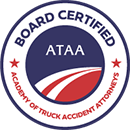Types of Trucking Accidents
No two truck wrecks are the same. The cause of the collision, the way the truck and any other vehicles were positioned during the crash, and the force of the collision itself all impact the resulting devastation and injuries of the wreck. We’ve come to categorize truck accidents based on the type of crash, which takes into consideration many factors such as the cause and the positioning of the affected vehicles. These defining types are an integral part of a truck wreck investigation.
Below you’ll find a list of many of these categories, along with crashes that are additionally defined by the type of truck that was involved in the collision:
Head-On Collision
Head-on truck collisions happen when a truck crashes front-first into another vehicle or object. These collisions often result in devastating injuries due to the inherent force of the wreck.
Jackknife Accident
A jackknife accident results when a commercial truck jackknifes, which happens when the front part of the vehicle stops too quickly for the trailer’s momentum. That momentum will carry the trailer forward, causing it to swing to the side, causing a collision with other cars.
Rear-End Collision
A rear-end collision occurs when one vehicle impacts the back of another vehicle. With trucks, rear-end collisions commonly occur due to the increased distance and time a large truck needs to brake.
Sideswipe Accident
Sideswipe accidents happen when one vehicle’s side scrapes up against the side of another vehicle, often during a turn or when changing lanes too quickly. Truck sideswipes are common due to the larger width of most trucks.
T-Bone Accident
T-bone accidents occur when one vehicle crashes face-forward into the side of another vehicle, resulting in a “T” shape. T-bone accidents involving trucks can be especially dangerous due to the force and weight that a truck carries.
Truck Rollovers
Truck rollovers are unfortunately common, and often result in devastating injuries. These occur when a truck is forced over on its side or rolls over due to the force of a crash or by forceful winds or overloading.
Underride Truck Accidents
Underride crashes are extremely dangerous and involve a smaller motor vehicle riding under the rear or side of a semi-truck. These accidents can cause catastrophic injuries or even death.
Delivery Truck Accidents
Delivery truck accidents are more common than many people believe. It can be difficult to determine who’s liable for a crash involving a UPS, USPS, or FedEx truck, but doing so is imperative to a full recovery.
Dump Truck Accidents
Dump truck accidents can cause significant injury simply due to the weight of a dump truck and the cargo it’s carrying. Debris can also cause accidents involving these vehicles.
Passenger Bus Accidents
If you were in an accident involving a passenger bus like a city bus, commuter bus, or charter bus, you may have grounds for legal action depending on the cause of the crash.
Oversize Load Accidents
Oversize load accidents often result when a truck carrying an oversize load, such as when hauling a large vehicle or building, makes an unsafe maneuver or travels too fast for conditions. The drivers of these vehicles must be extremely cautious.
School Bus Accidents
If school bus drivers or other drivers around school buses don’t drive carefully, a school bus accident can easily result. Special rules apply to those driving near school buses which must be observed.
Cement Mixer Accidents
Cement mixer accidents can result in serious injuries due to the heavy weight of most cement mixers. If you’ve been involved in an accident with one, you may be able to take legal action.
Logging Truck Accidents
Logging truck accidents can result in major devastation when logs spill out over the highway and into other vehicles. Finding out who is liable for these wrecks is vital.
Deadhead Trucking
When a large truck with a trailer travels back after delivering a load of cargo with an empty trailer, this is what is referred to as deadhead trucking. Trucks with empty trailers can be dangerous because the driver may be unaccustomed to traveling with considerably less weight, making the truck an easier target for jackknife accidents.





